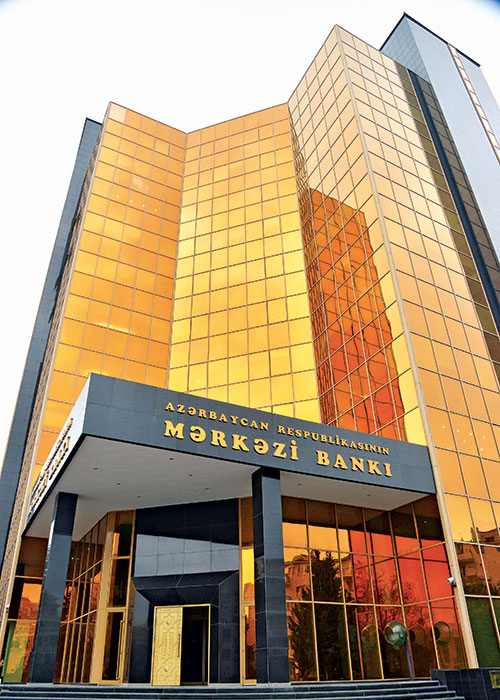BANKING SYSTEM IN AZERBAIJAN

The banking system is considered an important element of the financial system of Azerbaijan. Today banks leave behind other financial mediators for the volume of their assets and capital, as well as regional coverage.
Currently, there is a developed two-tier banking system based on market principles (the Central Bank of the Republic of Azerbaijan in the first tier, commercial banks, and other non-bank credit organizations in the second tier).
The Central Bank of the Republic of Azerbaijan was founded in 1992. The main mission of modern central banks is to maintain prices and financial stability.
The Central Bank performs a number of functions defined by law In order to achieve its goals.
The Central Bank’s main function is to set and conduct the country’s monetary and exchange rate policy. Monetary policy is conducted using a variety of tools. These tools include buying and selling securities issued by the state and the Central Bank, determining interest rates on loans issued by the Central Bank to banks, requirements for required reserves of banks, etc. Through these tools, the Central Bank uses opportunities to influence price stability, economic growth, as well as ensuring financial stability in the country by regulating the amount of money in circulation.
One of the critical functions of the Central Bank is to issue the national currency (manat) of the Republic of Azerbaijan. According to Article 19 of the Constitution of the Republic of Azerbaijan the Central Bank enjoys this exclusive right. Within this authority, the Central Bank issues manat denominated banknotes and coins to and withdraws from circulation, and takes actions on their circulation.
Determining the official exchange rate of the manat
The Central Bank sets an official exchange rate of manat against foreign currencies. The exchange rate is one of the factors affecting the country's foreign economic relations. The Central Bank determines the official exchange rate of the manat, taking into account the average market rate. Economic institutions consider the official exchange rate when conducting foreign exchange transactions.
The Central Bank also performs the function of currency regulation and control. Foreign currency regulation and control is a set of measures that support the conduction of the exchange rate policy, maintain international settlements, regulate foreign currency circulation, execute transactions, restrict foreign currency use, and exercise government control over foreign currency movement.
The Central Bank actively uses gold and foreign exchange reserves to protect the exchange rate of the national currency and regulate the balance of payments. At the same time, the Central Bank acts as a guardian of the country's gold and foreign exchange reserves entrusted to it, and at the same time performs the function of their management. Thus, gold and foreign exchange reserves currently play a stabilizing and "guarantor" role in international settlements. The Central Bank's gold and foreign exchange reserves include gold, precious metals, and precious stones, foreign currencies, foreign currency funds held in the accounts of foreign central banks or other financial institutions, and other internationally accepted assets. The Central Bank gives information in the media on the total amount of gold and foreign exchange reserves managed by it at least once a quarter.
One of the functions of the Central Bank is to collect the country’s balance of payments statistics and compile a reporting balance of payments. The balance of payments is a statistical reporting system that shows indicators and reflection of the summary of economic operations (goods and services, investments) carried out by the population of the country and economic entities (enterprises and organizations) operating in Azerbaijan with foreign persons during a certain period. The balance of payments is used to calculate the GDP (gross domestic product) of each country.
The Central Bank develops the country’s consolidated (both public and non-public) foreign debt statistics and international investment balance, summarizes and disseminates data. This function was assigned to the Central Bank on the basis of the changes made to the Law of the Republic of Azerbaijan on the Central Bank of the Republic of Azerbaijan dated 20 October 2015.
External debt statistics and international investment play a special role in the formation of the international ranking of the national economy, as well as considers macroeconomic policy decisions. These statistics are formed on the basis of accounting of liabilities of the country's institutions to institutions of foreign countries.
The Central Bank organizes, coordinates, regulates activities of, and oversees centralized interbank and other unlicensed payment systems as part of this function.
Currently, such systems include The Real-Time Gross Settlement System (AZIPS), The Low-Value Payments Clearing and Settlement System (LVPCSS), The Interbank Card Center (ICC). The Central Bank sets requirements for participation in these systems, including security requirements for participation, requirements for the sustainability of payment systems, and requirements for forms of payment documents.
Azerbaijan Deposit Insurance Fund was founded on 9 February 2007 with the decree of the President of the Republic of Azerbaijan, Ilham Aliyev, and started to its operation onAugust 12, 2007, The purpose of establishing the Deposit Insurance Scheme is to prevent the risk of losing money deposited by individuals and to ensure the sustainability and development of the financial and banking system whenever banks and local branch offices of foreign banks become insolvent. Azerbaijan Deposit Insurance Fund is regulated by the Trustee Board and by the Executive director based on the Law on Deposit Insurance.
According to the amendments made to the Law of the Republic of Azerbaijan “On Deposit Insurance” on December 18, 2020, the amount of compensation for protected deposits of individuals was increased from 30,000 to 100,000 manats.
Currently, 24 banks operate in the Republic of Azerbaijan.



